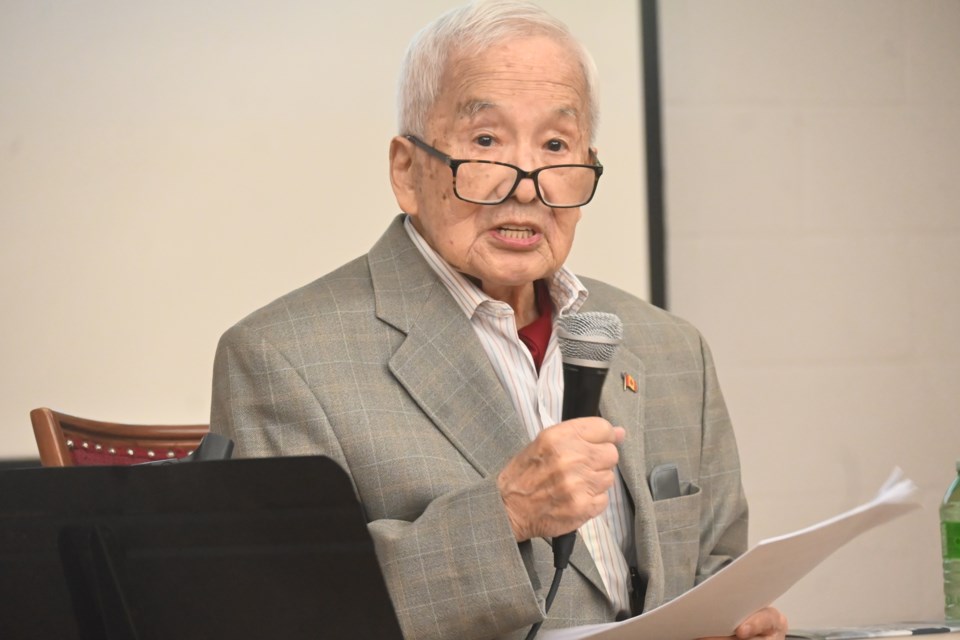Second World War veteran Frank Moritsugu recalls what it was like to be forced out of his home in British Columbia.
After Japan came into conflict with the United States and its allies in the war, anti-Asian sentiment rose. Moritsugu was eventually forced into an internment camp under provincial and federal government policies of expelling Japanese Canadians from their homes and selling off their property.
Speaking to a full room at the Newmarket Community Centre at an event this week hosted by the Newmarket Historical Society, the 100-year-old said although governments justified their actions by saying it was to protect Japanese Canadians from a hateful public, he said records show that was not the truth.
“The real reasons for mistreatment were political, economic and racist,” he said.
The centenarian recounted his life story as a second-generation Japanese Canadian, going through the internment camps brought about by racist sentiment and experiencing other discriminatory government policies.
He said that despite having grown up in Canada, the policies of the time limited his options.
“In the eyes of the law,” he said, “I wasn’t as good a Canadian as the majority of my former schoolmates.”
Things changed as the military needed more translators to address prisoners of war. He joined the army once a ban on Japanese Canadians lifted, becoming part of the intelligence corps as an English-Japanese translator.
The veteran would go on to have a distinguished career in journalism, becoming the first-ever Japanese Canadian writer-editor hired by Maclean’s magazine in 1952, and also the Toronto Star. He would later take positions with provincial government committees and then as a Centennial College professor.
Author Ted Barris, who has written about Moritsugu, said it is incredible the veteran had no bitterness.
“He still loves Canada, wanted to serve it desperately,” he said. “Served its press, its media and built a career of extraordinary journalism and writing in spite of it all because of the love of his country.”
Historical society director Nancy Fish has known Moritsugu for 30 years — he babysat her nieces. She said the society sought to have him speak three years ago, but the pandemic delayed things.
“I really feel the warmth of Newmarket coming to see a 100-year-old citizen and war veteran,” she said.
Town councillors also attended, with councillors Bob Kwapis and Christina Bisanz presenting a certificate recognizing Mortisugu.
“My deepest regret and shame that this country could have ever treated its people poorly,” Bisanz said. “But clearly, through your leadership and your ability to influence using words and using stories, you teach us how to be different and why you need to be different and embrace diversity and inclusivity.”
Moritsugu recounted the push in the 1980s to make up for the injustices against Japanese Canadians, culminating in 1988, when the government agreed to award surviving internees with $21,000 as symbolic compensation.
“It was a better happy ending than most stories get these days,” he said.
Still, he said racism carries on to this day, citing recent anti-Muslim and antisemitic incidents.
Moritsugu spoke about the importance of journalists of the time spreading information about internment, and readers in time seeing internment for how bad it was.
“It should never ever happen again is one thing one hopes,” he said. “Other people really grab that idea, and I hope they hold onto it and also pass it on, as I’m trying to do.”



